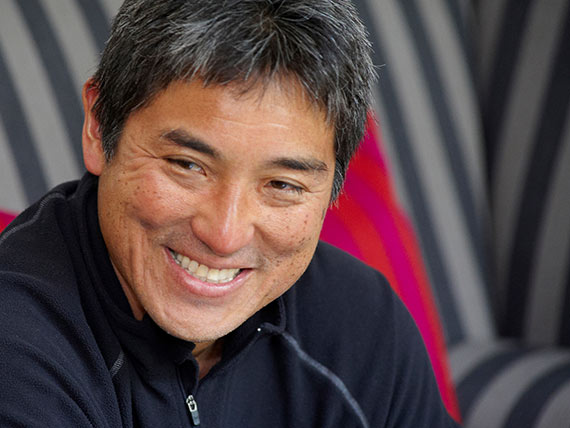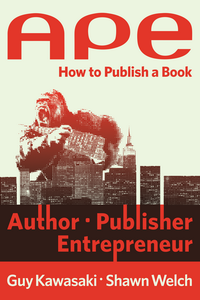I am happy to present you with an interview with the one and only, Guy Kawasaki author of APE, Enchantment, What the Plus!, and nine other books. Guy is also the co-founder of Alltop.com, an “online magazine rack” of popular topics on the web. Previously, he was the chief evangelist of Apple and worked directly for Steve Jobs.

It’s not everyday I interview someone who knew Steve Jobs personally. Of course, I had to ask Guy how Steve Jobs inspired and influenced him in the writing of his latest book APE.
If you’d like to read more about what Guy learned from Steve Jobs, he wrote a brilliant post on the topic: What I Learned From Steve Jobs – Be sure to check it out after you read the interview.
APE Author, Publisher, Entrepreneur
 The publishing world has been turned upside down and the changes are not only revolutionary, but they can be scary, too.
The publishing world has been turned upside down and the changes are not only revolutionary, but they can be scary, too.
What’s a writer to do?
Thankfully, Guy Kawasaki and Shawn Welch have written the book that will help you plot a course as an Author, Publisher and Entrepreneur, APE.
If you’d like to learn how to publish a book, APE provides what you need to know.
APE is not only a guidebook through the publishing revolution, it is an invaluable tool because it gives you the information to take control of your writing career and successfully reach your publishing goals no matter where you currently are in the process.
Exclusive Interview with Guy Kawasaki
Q: You are a successful published author and with APE you are generously sharing your insights with others. What motivates you to help others?
My motivation is that I’d like to make the world a little better by empowering people to write books and create cool products. My personal mantra is “Empower people.” I try to do this with my writing, speaking, and advising.
Q: Why do you call it “artisanal publishing”?
I call it artisanal publishing because self-publishing and vanity publishing have the negative connotation that the only reason someone published a book herself is because it wasn’t good enough for a traditional publisher.
I want the term to come to describe the process where a craftsman controls the entire process of creating a book in the same sense that artisanal brewers, bakers, and winemakers control their craft.
Q: While reading APE I realized how important this book is for today’s writers. Is APE the future?
Saying that APE is the future is arrogant. There are many pioneers of artisanal publishing that came before me, and there will be many after me. I hope to simply make a ripple in the pond at this point in time.
Many people have books in them, but they are afraid to release them because of all the bad advice they’ve heard about who can and should write a book. APE is for them, and I hope it’s as long-lasting as The Elements of Style, The Chicago Manual of Style, and How to Win Friends and Influence People.
Q: Why should writers consider artisanal publishing over traditional publishing?
Honestly, most writers won’t have the luxury of choosing between both, so artisanal publishing is the only choice.
That said, artisanal publishing is often the better choice anyway because an artisanal publisher is in control of her craft in terms of content, design, and timing, and an artisanal publisher can also make more money per book than her traditionally published colleagues.
Artisanal publishing, however, requires more discipline and more work because one is responsible for all phases of a book.
Q: Is there money to be made with artisanal publishing?
There’s lots of money in publishing–something like $20 billion in the United States every year. But this doesn’t mean artisanal publishing is easy because there are thousands of publishers and authors who are going after the $20 billion. Still, at least there are many precedents for the possibility of making money by artisanal publishing.
Q: For writers who have not written a book yet and are obviously nowhere near publishing, is APE a book they should read now or later?
They should read APE now because it provides a road map of the process of bringing a book to market. By knowing what one will go through, one can better prepare for what’s going to happen during the entire process.
Q: I love how detailed and concise APE is and I was pleasantly surprised when you started talking about rip-offs. Tell us a little about rip-offs and how reading APE will help authors avoid them.
I read a story that said that 81 percent of a survey sample of Americans believe they have a book in them. When there are this many people who think they can/should write a book, there are bound to be some unscrupulous folks who want to take their money.
APE provides a very pragmatic framework. Overall, you should do as much as you can by yourself. This means writing your book, producing it, and marketing it by yourself. There are three points to use professionals: content editing, copy editing, and cover design. The totality of these fees should seldom exceed $3,000-4,000. Any amount over that should set off alarms.
Another ripoff test is when anyone guarantees you results such as reviews, blog coverage, or Hollywood agents.
Q: You talk about DRM and Copyrights in APE. How important is copyright protection to artisanal-published works? What is your advice?
My advice is to write the best book that one can, market it to the best of one’s ability, and let the chips fall where they may. One should spend about 1 percent of one’s energy protecting one’s work and 99 percent of one’s energy making something worth ripping off.
If one writes something great, and it achieves commercial success, then one can hire lawyers to fight copyright issues.
Q: I am fascinated that you personally knew Steve Jobs. How did he inspire you? In what way does that inspiration influence you today and did it influence the writing and publishing of APE?
Steve Jobs was a humongous influence on my life. He taught me three important lessons:
First, people cannot tell you what they want–they can only tell you how to revise what they already have.
Second, design matters–maybe not to everyone but to enough people.
Third, never let the opinion of other’s limit what you try to do.
These principles heavily influenced APE. First, I decided to write it because I decided people needed it, not because I did any “market research” to prove it was needed. Second, my co-author, Shawn Welch, did a great job designing it, and Holly Thomson did a fabulous job with the cover. Third, I wrote APE because I wanted people who were probably told that they couldn’t write a book to ignore the naysayers and give it a try.
Q: Do you plan to continue revising APE as artisanal publishing evolves?
Shawn and I revise APE almost every day. There are three factors at work here: first, artisanal publishing is changing rapidly so there’s always something to address, and APE has passionate readers who love to point out ways to improve it.
Second, artisanal publishing is very well-suited to rapid and frequent changes because we can swap in new ebook files and print new versions on demand.
Third, Shawn and I are both a little OCD, so we can’t stand the thought that there are mistakes and shortcomings in our book.
Thank you very much for your time and your answers, Guy, and thank you and Shawn for pointing the way and empowering today’s generation of writers!
Available on Kindle & in Paperback
Here are the links for APE:
(Affiliate links)
Did you enjoy the interview and are you ready to take the next step in your writing career? Let us know in the comments.
~Bryan

